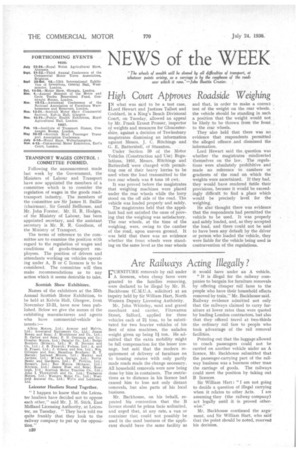NEWS of the WEEK
Page 34

If you've noticed an error in this article please click here to report it so we can fix it.
The wheels of wealth will be slowed by all difficulties of (rampart, al Whatever paints arising, as a carriage is by the roughness of the roads over which it runs."—fohn Beattie Crazier.
High Court Approves Roadside Weighing IN what was said to be a test case, Lord Hewart and Justices Talbot and Goddard, in a King's Bench Divisional Court, on Tuesday, allowed an appeal by Mr. Frank Ernest Prosser, inspector of weights and measures for Gloucestershire, against a decision of Tewkesbury magistrates dismissing an information against Messrs. J. C. Ritchings and G. E, Battershell, of Staunton.
finder Section 59 of the Motor Vehicles (Construction and Use) Regulations, 1931, Messrs. Ritchings and Battershell were charged with permitting one of their heavy lorries to be used when the load transmitted to the two rear wheels was 8 tons 16 cwt.
It was proved before the magistrates that weighing machines were placed under the rear wheels while the lorry stood on the off side of the road. The vehicle was loaded properly and safely. Tbe magistrates held that the appellant had not satisfied the onus of proving that the weighing was satisfactory. The rear wheels, at the time of the weighing, were, owing to the camber of the road, upon uneven ground. It was held that there was no evidence whether the front wheels were standing on the same level as the rear wheels and that, in order to make a correct, test of the weight on the rear wheels, the vehicle should be standing in such a position that the weight would not: be be likely to be thrown from the front to the rear wheels.
They also held that there was no evidence that respondents permitted the alleged offence and dismissed the information.
Lord Hewart said the question wa-s whether the magistrates misdirected themselves on the law. The regulations were absolutely prohibitive and made no reference to cambers or gradients of the road on which the weights were ascertained. If they had, they would have rendered futile their provisions, because it would be exceedingly difficult to find a place which would be precisely level for the weighing. He also thought there was evidence that the respondents had permitted the vehicle to be used. It was properly and safely loaded, and, as they accepted the load, and there could not be said to have been any default by the driver or person who loaded the vehicle, they were liable for the vehicle being used in contravention of the regulations.




























































































